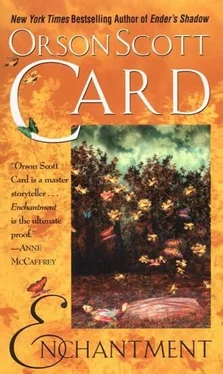Orson Card - Enchantment
Здесь есть возможность читать онлайн «Orson Card - Enchantment» весь текст электронной книги совершенно бесплатно (целиком полную версию без сокращений). В некоторых случаях можно слушать аудио, скачать через торрент в формате fb2 и присутствует краткое содержание. Жанр: Фантастика и фэнтези, на английском языке. Описание произведения, (предисловие) а так же отзывы посетителей доступны на портале библиотеки ЛибКат.
- Название:Enchantment
- Автор:
- Жанр:
- Год:неизвестен
- ISBN:нет данных
- Рейтинг книги:5 / 5. Голосов: 1
-
Избранное:Добавить в избранное
- Отзывы:
-
Ваша оценка:
- 100
- 1
- 2
- 3
- 4
- 5
Enchantment: краткое содержание, описание и аннотация
Предлагаем к чтению аннотацию, описание, краткое содержание или предисловие (зависит от того, что написал сам автор книги «Enchantment»). Если вы не нашли необходимую информацию о книге — напишите в комментариях, мы постараемся отыскать её.
Enchantment — читать онлайн бесплатно полную книгу (весь текст) целиком
Ниже представлен текст книги, разбитый по страницам. Система сохранения места последней прочитанной страницы, позволяет с удобством читать онлайн бесплатно книгу «Enchantment», без необходимости каждый раз заново искать на чём Вы остановились. Поставьте закладку, и сможете в любой момент перейти на страницу, на которой закончили чтение.
Интервал:
Закладка:
"Ivan's mother is a witch?" Father Lukas sharply asked.
"I never knew till now," said Ivan.
"Bad enough when she was just a Jew," Father Lukas grumbled.
"She saved my life a dozen times," said Katerina. And then she held up the dozens of charms that she had made during those long days in the woods. "Our soldiers will also wear these, of her design, but with my power in them. Aware will make them quicker to recognize their enemy's intentions. Baffle will confuse the enemy, while this potion, which they must drink just before going into battle, will make their movements faster, their aim more accurate. You can be sure that the Widow will have her own charms on every soldier in her army—but her designs are not as deft as Mother Smetski's."
It didn't reconcile Father Lukas to this whole business of relying on witchcraft, but he was a practical man, and there would be time enough to stamp out charms and potions after the war was won, the witch defeated. Someday when a woman gave a gift to a departing soldier, it would be nothing more than a token of her love, and not an amulet with powers in it to protect him in the fight. As for the tales of flying across oceans, no one seemed to doubt them because no one understood what they really meant. What was an ocean to them, who had seen only forest in their lives? What did it mean for a huge house to fly, when there was no house that they had seen as large and heavy as a transcontinental jet? They had never heard a noise so loud as the engines of a plane. They had never seen anything move as swiftly as a car on the interstate. So whatever mental picture they received from Katerina's account, it could not be very close to what had really happened.
What interested them was the soap opera—the jilted lover, coming with charms to win Ivan back or punish him, only to discover that the witch had tricked her, and both the potions had the power to kill. And then the adventure of detecting the witch in the flying house, and their departure just before it flew away and disappeared—that one, too, was sure to be added to the fund of folklore.
I have already changed the future, thought Ivan. There will be different folktales now, to take into account in my dissertation. The lists and charts will be altered.
And then he wondered: What if the folktales I studied already included what we added here? What if the Ivan of the Russian folktales—Ivan, who was as common as Jack was in the English tales—was really Ivan Smetski, a Jewish boy from Kiev?
Now that he thought about it, he could see that he was right. For he had proof. He knew the origin of the tales of Baba Yaga's house that stood up on chicken legs and ran from place to place at her command. In all his years of study, he had never seen a single speculation from a folklorist or literary historian that the original of the witch's walking hut might be a hijacked 747. Yet there were the stories all along.
So everything that is happening now had already happened before I was born, thought Ivan. The hijacked jet. The coming of a common peasant named Ivan, untrained in battle but blessed with magical charms and gifts from his mother. The man who marries the princess, but then finds himself in mortal danger. He had read these tales before, never guessing that he would live through the originals.
What, then, of the tales that Sergei had written down at his behest? Those were the pre-Ivan tales, the stories from the time before Baba Yaga got her walking house. The lore of the folk before being corrupted by his backward passage through the centuries.
But what did the stories say the outcome would be? Ivan won in most of the tales Ivan knew, but that didn't guarantee a victory in this case, for not one of the tales told of Ivan commanding a group of grenade-throwing boys in the midst of battle. Did the silence mean that they would lose today, their exploits forgotten because everyone who witnessed them had died? Then only the women of Taina would be left, to tell the tales that they already knew before the battle's start.
No, no, he could not reach any conclusion from the silence. Besides, there were more Ivan stories that were nothing like the things that he'd already done. Couldn't he live to have more adventures? Only if they had a victory today, for it was certain that in defeat there would be no escape for him.
Of course, those other Ivan stories might be more embellishments, told about a legendary figure who was dead.
Russian fairy tales were the only ones he'd read that were so grim, even the princess sometimes died.
Why couldn't I have been born a nice Protestant boy from Omaha or Sacramento? Why couldn't Katerina have been the unattainable girl that somehow agreed to let me take her to the prom? Why couldn't I have been the track star with the letters on my jacket, instead of making bombs and Molotov cocktails, and sending my wife into the air to face a dire enemy alone?
Lost in thoughts like these, Ivan let the conversation drift around him until someone called him back. Misunderstanding his inattention, Sergei whispered to him, "Don't be afraid. I believe God has chosen you for a great work."
To which Ivan, just as quietly, replied, "He chose his own son, too, and look how that turned out."
At last the councils and the conversations ended. Ivan and Katerina slept then, their first time together on the straw mattress of her bed in King Matfei's house. They did not make love, but only held each other, whispering their happiness over the time they had together, plus a few hopeful comments about the baby that yes, indeed, Katerina carried in her womb.
It was a fine morning for a war. They set out with songs and tears—the songs of men putting on a show of bravado, the tears of women mourning in advance while protesting through their sobs that they knew God would protect him—husband, son, brother, father. It was a scene that had played out ten thousand times already, and would play again ten thousand more.
They marched that day and slept that night, consuming half the food they carried with them. What more was needed? If they won. they would have Baba Yaga's lands to pillage; if they lost, there would be no need for food at all. The second half of their supply was only to feed them if by some chance the battle lasted until a second day.
Somewhere behind them, on a high hill, Katerina would be launched at dawn, the few men she had with her watching her out of sight, then rushing to bring their report. Ivan tried not to think of that, but rather to concentrate on the task at hand. A dozen match boys, including Sergei, who—though a good thrower—could not possibly dart in and out among the fighting men. Four times as many who carried a half-dozen grenades and cocktails each. The grenades, they knew, were to throw once at the start, to frighten the peasants of Baba Yaga's army, and then to hold in reserve, for they were too dangerous to use among the soldiers, where the shrapnel could kill a man of Taina as easily as his foe. For the close-in work, the cocktails would do the job, and when a boy had run out of his supply, he was to flee back behind the line of battle, to wait. If the worst came, and they lost the day, then these boys were to be the rear guard, using their grenades to cover a retreat, delaying the enemy long enough that there might be hope for some, at least, to get away.
Get away, yes, but not back to Taina, for that would be Baba Yaga's land, and the women would be given to her followers. Any man found there after a defeat would be killed or enslaved and sold far away. To Constantinople, perhaps, where they might live as Christians despite their slavery, to weep the remainder of their days, remembering their wives and daughters, now belonging to other, crueler men; remembering their sons and brothers who were lucky enough to die in battle rather than living out their lives in such despair.
Читать дальшеИнтервал:
Закладка:
Похожие книги на «Enchantment»
Представляем Вашему вниманию похожие книги на «Enchantment» списком для выбора. Мы отобрали схожую по названию и смыслу литературу в надежде предоставить читателям больше вариантов отыскать новые, интересные, ещё непрочитанные произведения.
Обсуждение, отзывы о книге «Enchantment» и просто собственные мнения читателей. Оставьте ваши комментарии, напишите, что Вы думаете о произведении, его смысле или главных героях. Укажите что конкретно понравилось, а что нет, и почему Вы так считаете.










